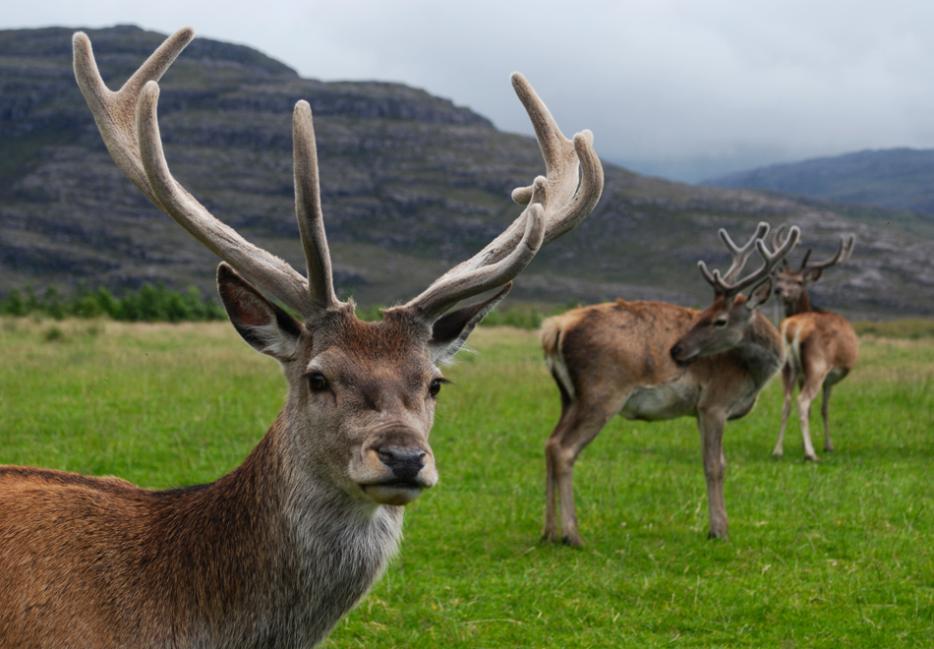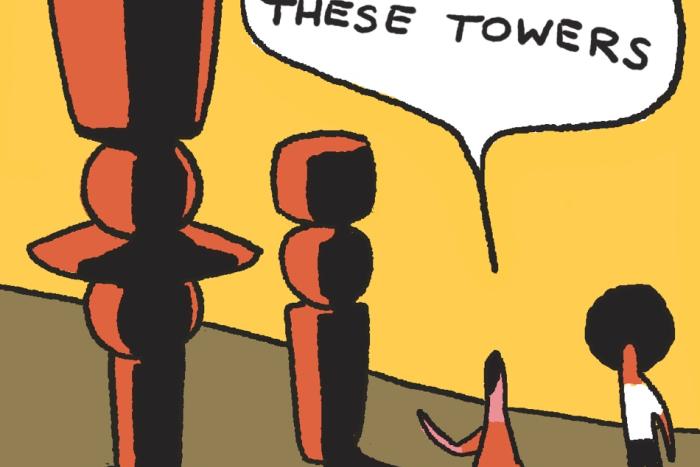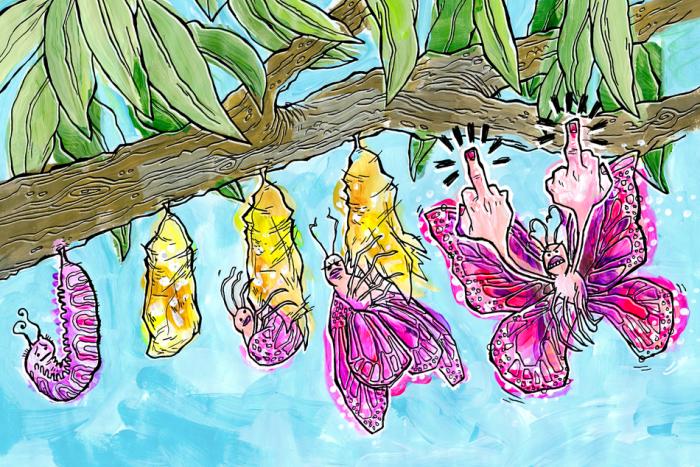The man pulled up in the kind of generic SUV that looks simultaneously nondescript and expensive, its thick tires churning the gravel drive with an elated dominance. He came to a harsh stop and waved at Archie Williams, who’d been expecting him. Without fanfare, the two went around the ass of that all-American vehicle and removed a fresh corpse from the trunk. The body was warm in the November chill, curls of pale steam still rising from the soft, black ridges of its muzzle. It was a sweet muzzle.
Poor Bambi.
Twenty minutes earlier, the deer had been eating, probably. Doing all that deer shit like looking adorable and pooping neat little pellets and getting hit by cars in New Hampshire. I think about the kind of death he had, the same way I ponder the thought that sears those unknowable final moments of a man killed by a falling toilet, or whatever horrible tragedy makes the paper.
Although … on the horrible tragedy scale, is blissful ignorance until the very moment of demise really so much worse than lingering in the littoral space of hospice? It’s no secret that we are inoculated against the tragedies we see most often, as life generously provides us with the callouses we need, be it coming to terms with the biological shit-show of metastasis or tolerating violent, systemic racism without notice.
Anyway, I was standing outside an animal processes shed in rural North Carolina because I wanted to watch a deer get turned into meat.
The hunter heaved the deer up out of the back. Williams, who owns this processing business, helped him shoulder the surprising weight of the recently deceased, and then it began.
The choreography from this moment forward was seamless and performatively unthinking, just the smooth edges of muscle memory moving under the familiar strain of a sense of purpose. Into the open door shed the body went, the glazed and heavily fringed eyes of the feast impervious to the hungry flies that would attend them, were the weather warmer. The soft clouds of my breath hung in the air near my mouth; I watched as the wet exhaust of my body mixed with the sparse tendrils of humidity that curled and twisted out of the carcass. Alive, and not alive.
A cradle of sorts waited to receive the hot meat, the useless spine of the departed aligned with the wooden backbone, the deer’s splayed legs ready to be tied down to the posts supporting the macabre structure. Williams, in his monogrammed jumpsuit, stood at the helm, looking like a serial killer cum symphony conductor, delicately wielding a rather orthopedic implement plucked from the torture walls of the repurposed barn. Without a micropause for hesitation, Archie placed the implement atop the sloping forehead of the deer and began to saw.
*
Maybe it’s worth taking a moment to consider how I got here.
I used to be vegan. This particular dietary detour began when I was 13 years old, full of the kind of Kantian justice that typifies the righteousness of youth. But my reasoning at the time had less to do with compassion for animal suffering and more to do with the hypocrisy of meat-eating in a culture so divorced from the source of its fuel. Simply put, I didn’t want the guilty weight of death on my shoulders if I couldn’t serve that final judgment by my own hand. I only wanted to eat things I could bear to kill myself.
Turns out, I’m okay with wielding that kind of finality. Chickens, easy: bred-to-be-dumb dinosaurs that grow absurd flying muscles for our savage appetites. Cows, harder: smart but slow and dumbly endearing, playful but ignobly placid, walking delectable containers of grass-powered burgers. Pork was hardest: smarter than your dog, smarter than your young child, personable, emotional, orgasmic beings. (I’m pretty picky about the pork I eat these days, preferring the happy, pastured kinds that elaborately typify the insufferable yuppie class that so loudly sing its praises.)
I don’t eat bear.
One might assume that I found my way back to meat through a methodical process but, though slow, the decision was abrupt: I hit my twenties and decided I wanted to masticate some cow for my birthday. Maybe it was the drain of caring fatigue, my empathy strained more by worker conditions than the existential crisis of death on the menu, or maybe I simply found my cruel streak late, but I suspect it mostly had to do with embracing the soothing balm of nihilism. The comfort of a meaningless existence, the reassurance of an inevitable death, the truth that one day everything you’ve ever loved or ever could will cease to exist: all tender promises from an unfeeling universe that I’ve found pair nicely with murder for lunch.
*
The sound of the hand saw chewing through the leathery casing of the deer’s skull should have been nauseating, but it wasn’t—just a rhythmic grating noise across the thick mammalian safe housing that most precious organ of tofu consistency.
The hunter wanted the rack.
Leaving the clean edge of a deli saw, the top of the animal’s skull was lobbed off with ease, pink brain glistening, its exposed folds and dips bathed in clear, slippery cerebrospinal fluid. It looked like the deer had wandered into a freak machining accident. I wanted to press my fingers into the satin wrinkles, feel with my own skin the slick self of another. All of those wet electrics that made the deer a deer—that coiled shock of hunger and lust and reactions, reduced to a beautiful anatomical cross-section. The sight was humbling, easy to get lost in. But Archie had already moved on.
The soft clouds of my breath hung in the air near my mouth; I watched as the wet exhaust of my body mixed with the sparse tendrils of humidity that curled and twisted out of the carcass. Alive, and not alive.
Grabbing a forelimb and bearing down with the saw, Williams broke the bone, cutting through everything but the skin on the underside of the break. With that, the floppy limb was tied to the corresponding leg of this engineered murder manger. He did this until all of the legs were broken, the deer secured to the apparatus with an attention to detail that would make the Marquis de Sade grin with approval.
Next, a slick and easy cut with a blade, from the mandibular symphysis of the jaw to the pubic bone, top to tail, the pressure of compacted innards splitting this newly opened seam like an overripe tomato. It’s easier to peel a deer than one may think, the connective glue that holds skin to muscle no match for the pressure of fingertips or the tug of skin away from the body.
Careful not to disrupt the earthen stink of the peritoneal sack—that sticky container of guts and shit and bacteria—Williams reached his hands inside the deer like a doctor going in for a baby, dug his fingers up behind the bulge and ripped it out with deft confidence. The guts went in a big plastic trashcan, landing with a squish and disrupting the local community of fat, lazy flies.
Archie cautioned me not to look inside the gut can, but anyone who’s ever met me will tell you what a laughable warning that was. Peering into the fetid abyss, I found the inside purpled and brown and roiling with the pebble-smooth edges of liver and bowel.
The deer was shot in the chest, and the carnage inside told just how catastrophic the damage. Archie scooped out handfuls of dark red clots, the pink fragility of its spongey lung tissue screaming vermillion protestations.
Perhaps the fragility of this gentle herbivore is moot at this point, though, the moment of its transition from living thing to a neatly packaged bundle of dinners and refuse long past. That’s the curious thing about cleaning and butchering meat: even if there is an empathetic stirring when faced with the death of such a regal creature, those tender pains are quick to evaporate as the scene becomes more and more explicit. Whole and warm, the deer is majestic, its tawny, furred corpse a well-muscled spectacle in the incongruous staging of some dude’s gas-guzzler. But flayed, its skin open, revealing the same frank horror of a hoarder’s pulled drapes, broken legs akimbo, heart in a trash can, it’s not the same. There was no secret sigh of loss when I saw the lengthy fringe shielding its dilated pupils, no pang of sympathy when its throat was slit for draining. Just the raw, Leatherface mechanics of a country murder shed putting food on the table. We all die, too, dear deer. I can only hope to be as useful as you in my mortem.
The deer is no more. He’s just food now. Mourn him if you want, but it will not lessen his realized mortality. A hook came out of the ceiling, dangling at the end of a loudly protesting chain. It entered the meat, aiming deep and landing securely. With the excoriating groan of metal on metal, the pulley system was engaged,
As the pulley rose up, the deer was peeled out of its skin, legs tethering it to the theft of its dignity. A few snips and the hide was free, meat hanging in the air, swinging above the heather-pink splatter of brain on the ground and black-red patches of posthumous exsanguination. Heaving a sigh of completion, Archie Williams inspected this cleaned source of nutrients and, with one great shove, pushed the meat down the carcass zipline, to the butcher.
It was a deer, but now it’s just dinner.
The Masticator is a monthly column about what, how, and why we eat the things we do.






